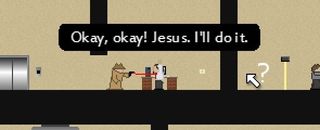
Gunpoint is an upcoming indie game where you get to break into high security buildings, rewire electrical circuits and punch guards repeatedly in the face. You'll also get to hold people at gunpoint and interrogate the hell out of them. It's being developed by Tom Francis; he's Section Editor on the UK edition of the magazine . Tom might work for us, but that's not the only reason we're covering Gunpoint. It's an inventive, exciting title in its own right. Conveniently, we have an exclusive interview with the creator. Nepotism FTW.
Read on for the info and a first glimpse of some exclusive concept art.
Watch an early talkthrough of Gunpoint here . Tom recommends you watch the video in HD so you can see what's going on. There's also a direct download link if you have any issues with the streaming.
PC Gamer: Hello Tom! Thanks for meeting up. I hear you're making Gunpoint in your free time. What's your current day job?
Tom: I work right next to you. You can see me from your desk! You're the web editor for the site I helped launch? We had lunch together today.
OK. Hi! I'm Tom Francis, a writer and editor for PC Gamer magazine and PCGamer.com (where you also work). Thanks for agreeing to pretend to be interested in my opinions for a bit!
PC Gamer: No worries. So what kind of game is Gunpoint?
The biggest gaming news, reviews and hardware deals
Keep up to date with the most important stories and the best deals, as picked by the PC Gamer team.
Tom: It's a 2D, side-on platform game about infiltrating high security buildings by rewiring the devices in them and tricking the guards. You're a little freelance spy who uses gadgets to jump really high, climb walls and hook different devices up to each other. You can also point guns at people to get out of a tight spot - or if you think you can get away with it, shoot them.
PC Gamer: When did you decide to make your own game, as well as writing about other people's creations?
Tom: Spelunky! When I played Spelunky. It's a low-res platform game by Derek Yu which randomly generates its levels each time you play. That one feature, so perfectly implemented, makes a really simple game fresh and exciting longer than games that cost millions to make. And Derek made it in Game Maker , an easy to use program anyone can buy cheaply.
I was always having ideas for games, but assuming I didn't have the technical knowledge to do them myself. Spelunky made me realise that you don't have to make a triple A first-person shooter to turn a good idea into a genuinely great game. Good design and a cheap beginner's program had produced one of my favourite games of all time, so I felt like I had no excuse. I boughtGame Maker and started fiddling. That was May last year.
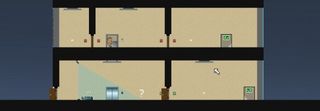
PC Gamer: Was the concept of Gunpoint there from the day one or did it stem from time spent experimenting with Game Maker?
Tom: The main mechanic, the way you can rewire any electronic device in a level to any other, wasn't in there at first - I thought of it while I was tinkering with other stuff.
I know you're supposed to focus on doing one thing well in a small game like this, but I am stupid and decided to do three.
The first thing I worked on was getting a really quick, easy and satisfying way to fling yourself around a game's levels - that's why the main character has some pseudoscience hypertrousers that let him jump ridiculously far wherever you click.
I also wanted you to be able to manipulate the environment in more interesting ways than just shooting the occasional exploding barrel. I wanted that feeling of messing with your enemies that I get from playing Deus Ex, so I got thinking about how I could distill that down to one mechanic that would lead to a lot of scope for the player to think up their own tactics.
A guy called Steve Gaynor, who did the Pauper's Drop bit of BioShock 2 and now works at Irrational Games, wrote a great post analysing what makes games 'emergent'. The short answer is the ability to change the state of things. I also wanted things to be interconnected somehow, so you could have chain reactions, and I knew that entities in games generally just have an 'input' and an 'output' field. So I thought it would be cool to give the player complete power over those. Let him link anything to anything, and invent his own solution to problems.
The third thing was to have a ridiculously complicated branching plot that altered and adapted depending on who lived or died, but that really was over-reaching for a first game. Apart from anything, having scripted story events mid-mission just doesn't suit the sort of game I ended up making, so that stuff got less relevant.
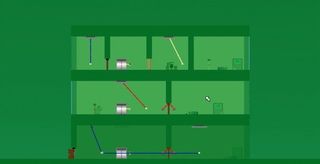
PC Gamer: You've previously mentioned that you sent out an early build of Gunpoint for testing. Did anything surprise you from the feedback you received?
Tom: Wow, yes. Firstly, people are lovely and surprisingly forgiving of terrible programmer art. They are less forgiving of giant, honking design flaws in the last bit of the last level, which I somehow manage to include with every new version.
It's much harder than I expected to know when you're right. I thought I would just address every problem testers had, but sometimes someone wants you to change the fundamental nature of the game. I haven't done that, but every time I decide to ignore some feedback, I wonder if I'm preserving the integrity of the game idea or just being an incredible asshole.
I also hacked in a quick and dirty way to record people's actions when they play - if they're up for it. When you pounce on an enemy in Gunpoint, you can then smack them in the face - you only have to do it once, but I don't stop you if you just keep going. When I watched the replays back, almost every single tester punched the first enemy in the face over 100 times. The game keeps count, and gives you increasingly distressed tutorial messages every 20 punches or so.
I'm probably going to make it so your victim starts to bleed and eventually dies if you keep going, just to make those people feel bad about themselves.
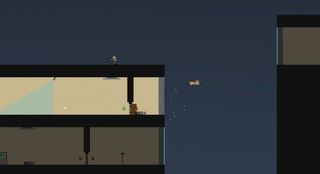
PC Gamer: You're currently looking for potential artists to improve Gunpoint's visuals from the placeholder graphics. Have you ever had a vision of the final product or are you looking forward to handing that part of the game over to someone else?
Tom: Kiiiiinda. 'Vision' is probably a bit grand, but I have some things in mind that can't be changed without hurting what I hope will be the appeal of the game.
It has to be set exclusively at night. The main character has to wear a trenchcoat and hat, and be mysterious. I don't want players to be forced into the shoes of a specific guy, I want it to scratch this itch I have to play a classic film noir figure, in a near-future espionage context. With hypertrousers.
I'm terrible at art, which is fine - it's my first game so I'm terrible at everything. But with art, it takes me a long time to make terrible stuff. At least I can write sloppy code and make bad design decisions quickly. So that's why I felt I needed help with that bit - I'd hate to spend a year clicking on pixels and still have an ugly game at the end of it.
So I made a really shoddy video to explain the game - another thing it takes me a long time to do badly - and asked if anyone wanted to help. The response was crazy, I've had more than twenty artists and animators happy to help out for free, and they've sent me awesome samples that range from adorably cute to moody and sinister. I haven't completely decided yet because some are still working on mockups, but there are a couple I'm already in love with. Can we put in a couple of my favourites?
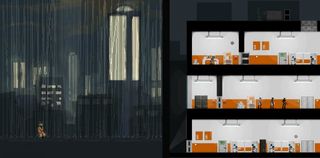
PC Gamer: We've also got some questions from the PC Gamer community. Here's a few that came up from multiple sources.
What technical skills did you need to learn?
Tom: I'd done a bit of Visual Basic coding at school, so I needed to learn GML, the scripting language that Game Maker uses to handle advanced or very specific stuff. You can start out using a simple drag-and-drop interface, and ease into programming as you start to understand how it works.
Any tips for anyone thinking of making a game (going beyond using Game Maker)?
Tom: I'd recommend doing what I didn't, and making a simple test game first. Give it a few levels and an ending - there's stuff you only learn when you get to that point. It also helps to play what's out there, and try to make something that isn't. Someone has probably done Gunpoint's main mechanic before, but I hope I've played enough games to see that it's not common, and that makes working on it really exciting.
Are you considering multiplayer mode?
Tom: No plans yet - I don't want to delay the first single player release for anything that isn't vital to it. I think with indie games, multiplayer sometimes has limited value because if the player base trails off, it kind of dies forever. I like to work knowing that even if only one person likes my game, they can play it as long as they want.
I also have no earthly idea how to do it.
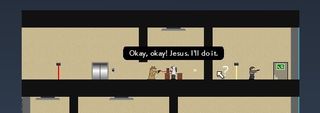
For more on Gunpoint, visit Tom's blog . What would you like to see included in the final game?
Most Popular







